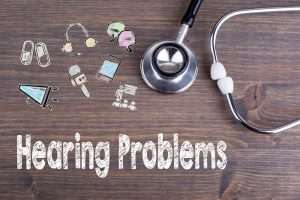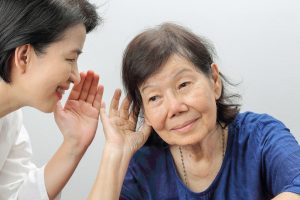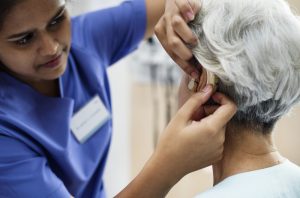Why Hearing Loss is Important to Fix
Hearing loss is such an important subject for everyone but especially for adults over the age of 65. A third of the people between 65 and 75 have hearing loss. Almost half of those older than 75 have measurable hearing loss.
The scariest part is that studies have shown that people with a hearing loss have a greater risk of developing dementia and/or Alzheimers. Very scary indeed!
Types of Hearing Loss
There are primarily 2 types of hearing loss. The first type happens when there is damage to the auditory nerve or the inner ear. This is called Sensorineural hearing loss and it’s usually permanent.
The second type is when the sound waves can’t reach the inner ear. This is called Conductive hearing loss and can usually be restored with either Medical treatment or surgery. A lot of the time Conductive hearing loss is caused by earwax, fluid, or a punctured eardrum.
Other types are sudden hearing loss or sudden deafness is, like it sounds, a rapid loss of your hearing. It can happen all at once or can take up to 3 days to happen. It’s considered to be a medical emergency and people who get this should see a doctor immediately.
Age-related hearing loss, called Presbycusis, gets worse as a person gets older. The medical establishment thinks that this may occur due to inner ear and auditory nerve changes.
People with Presbycusis have a problem hearing other people and can’t tolerate loud sounds. It appears to run in families and usually affects both ears equally. Because the loss happens slowly a person with it may not even realize that they have lost some of their hearing.
Lastly, there is Tinnitus which is also common in older people. Tinnitus is usually experienced/described as ringing, roaring, clicking, hissing, or buzzing in the ears. It can be a first sign of and / or accompany some other kind of hearing loss. It can also be a sign of other health problems – be sure to talk to your doctor about this to get it identified.
Causes of Hearing Loss
There are many different causes of hearing loss…
- One of the most common causes is loud noise. For instance loud music, loud machinery, and lawn mowers. Loud noise also contributes to Tinnitus.
- Ear wax or fluid buildup can block sounds from being carried to the inner ear.
- Punctured ear drum – by infection, pressure or if you put something in your ear (like a cotton swab). Again see your doctor for help with this as not getting it treated can cause permanent damage.
- Some health conditions like diabetes, high blood pressure, and bacteria / viruses, stroke, tumor, allergies, medication reactions, etc. can all affect your hearing. Be sure to talk to your doctor about these as well.
- Heredity is also a possible cause. There are a number of hereditary issues that can affect you at birth. There are also some that develop later in life. An example is otosclerosis which affects the bone in the ear and makes it harder for it to conduct sound into the inner ear (that’s part of my problem).
Effects of Hearing Loss
People, and especially seniors, don’t want to admit that they can’t hear as well as they used to. They make all kinds of excuses – someone is mumbling, they weren’t close enough, there was some other noise, the TV set is getting old and the sound level isn’t as strong, etc. I have heard (pardon the expression) them all – some of them I’ve even used myself.
Let me tell you that if it’s someone you care about who is making these excuses you need to get them to a hearing test center and get them some help. Let me tell you why.
It has been shown that people with hearing loss, if they don’t get a hearing aid or some other “intervention”, as they age will stop using the part of their brain that is associated with hearing. This ends up causing the brain to shrink.
There was a study published in 2013 that found that the cognitive abilities (i.e. memory and concentration) “declined faster in older adults with hearing loss, as compared to older adults with normal hearing”.
A 2011 study found that older people with hearing loss were at greater risk for developing dementia than older people with normal hearing. They also found that the higher the level of uncorrected hearing loss the higher the risk for dementia.
New Study Underway
There is a new study that is just underway that will be comparing hearing intervention (i.e. hearing devices and education) and just the hearing education. They are going to follow them for 3 years to compare the cognitive health of the hearing intervention group versus the control / health education group.
The researchers will also be looking to see if the intervention impacts other areas like “physical and social functioning, quality of life, and physical activity”. The collection points will be spread out across the 3 years to get more detailed information.
The study is called the ACHIEVE clinical trial. ACHIEVE stands for Aging, Cognition, and Hearing Evaluation in Elders. The study participants are just now being recruited so we should be hearing more about it in the next few years as they start collecting their data.
Summary
There is a lot of information showing the impact of hearing loss on cognitive health and in particular dementia. Older people who have hearing loss tend to isolate themselves because they can’t hear and participate in what is going on around them.
This isolation impacts their lives and in particular their emotional and physical health but until now we really haven’t understood to what degree. As I said earlier, if you are having hearing loss, even just a small amount, you should go get a hearing test to find out if you need an “intervention”, i.e. a hearing aid, implant, etc.
If you are 65 or older Medicare will cover the cost of the test and also most of the cost of a hearing aid (if that’s what you need). For those of you younger than 65 with medical insurance a hearing test is probably covered for you too.
If you don’t have insurance then go to a hearing center or to Costco. Both places will give you a hearing test for free. It will make a big difference in your life. If your hearing is fine but someone else who is close to you is having hearing issues then give them this same information and help them to get a test.
I have become a crusader on this because of my own hearing loss. It devastated my mother’s last years because she wouldn’t get a test or hearing aids. She isolated herself and those years were much harder and more depressing than they needed to be. Don’t let that happen to anyone you care about!!
More Information
For more information listen to my Podcast on Hearing Loss & Dementia
Here are a couple of places you can go to find a hearing test center near you:
Healthy Hearing – enter your zip code and they will give you a list of all of the audiologists in the area
Costco Wholesale – click on Find a Warehouse and filter by hearing aids (I think you have to be a Costco member)
3 replies to "Hearing Loss for Older Adults"
Thank you for this article. I will now wear my hearing aids again. When Covid happened and people were wearing masks is the first time I realized I need help. Then masks stopped and I guess I started to read lips! I never noticed I did this before. And now with the dementia added as a possibility I will now wear them daily. Thank you
Sally – I’m so glad that you’re going to start wearing your hearing aids again. It really is important for our brains! Happy Holidays to you!
Susan
лучший seo оптимизатор сочи
Компании ищут профессионалов, способных вывести сайты в топ.
Реальные отзывы помогают оценить уровень профессионализма.
Избегайте специалистов, которые гарантируют мгновенный результат.